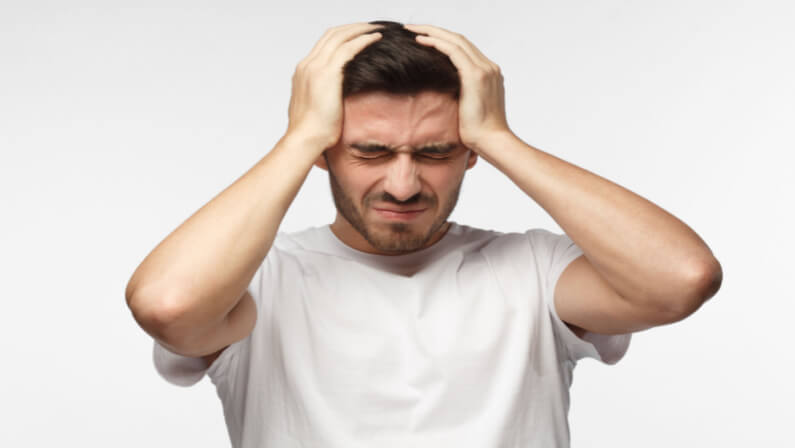Are you often plagued by tension headaches? If so, you’re not alone. In fact, tension headaches are the most common type of headache. But the good news is that there are things you can do to relieve them quickly and effectively. Keep reading to learn how to relieve tension headaches fast!
What is a tension headache?
A tension headache is a type of headache caused by tight muscles in the neck and scalp. It can cause mild to moderate pain, usually described as pressure or a tight band-like sensation around the head.
Usually, tension headaches are more common among adults than children, and symptoms may include dull pain on both sides of the head along with tightness in the neck and scalp muscles.
What are the types of tension headaches?
There are two tension-type headaches, which include:
Episodic tension-type headaches
Episodic tension-type headaches are the most common type of tension headache and typically occur less than 15 times a month. These headaches usually last between 30 minutes and several hours.
Chronic tension-type headaches
These types of tension headaches occur more than 15 times a month, usually lasting between 30 minutes and seven days. Chronic tension-type headaches can be debilitating, so it’s essential to seek medical advice if you experience them frequently or for longer than a few hours.
How common are tension headaches?

Tension headaches are very common and can affect both adults and children. According to the American Migraine Foundation, they are the most common form of primary headache, affecting 2 in 3 adults.
What does a tension headache feel like?
A tension headache can feel like a tight band-like sensation around the head, usually on both sides. It may also cause mild to moderate pain, which is usually described as pressure or tightness. The intensity of the pain can vary from person to person.
Other common symptoms of a tension headache include sensitivity to light and sound, difficulty concentrating, and fatigue.
Tension Headache Symptoms
Signs and symptoms of a tension-type headache include:
- Dull pain on both sides of the head along with tightness in neck and scalp muscles
- The feeling of a tight band around the head
- Sensitivity to light and sound
- Difficulty concentrating
- Fatigue
- Mild to moderate pressure or tightness
Tension Headache Causes

These five factors usually cause tension headaches:
- Stress. Stress can cause tension headaches, as the body responds to stress with changes in blood circulation and muscle tightness.
- Poor Posture. Sitting or standing for extended periods of time with poor posture can lead to painful tension headaches due to tension being placed on the neck muscles.
- Caffeine Intake. Consuming excessive caffeine can trigger tension headaches by causing dehydration and constricting blood vessels in the head, leading to pain and discomfort.
- Lack Of Sleep. Not getting enough sleep can result in tension headaches due to fatigue caused by a lack of restful sleep patterns and exhaustion from not having enough energy throughout the day.
- Tension Or Pain In Other Areas Of The Body. Muscle strain or injury, inflammation, or joint problems elsewhere may manifest as a headache due to referred pain sensations traveling up toward your brain from other parts of your body such as your neck or shoulders.
Tension Headache vs. Migraine
Tension headaches and migraines are two distinct kinds of headaches, though they can share similar symptoms. Tension headaches are the most common type of headache and generally cause mild to moderate pain.
Symptoms include a tight band-like sensation around the head, dull pain on both sides of the head with tightness in neck and scalp muscles, sensitivity to light and sound, difficulty concentrating, fatigue, and mild to moderate pressure or tightness.
Migraine headaches are more severe than tension headaches. They can cause painful throbbing in one area of the head, along with nausea, vomiting, blurred vision, dizziness, and sensitivity to light and sound.
How To Diagnose Tension Headaches
Diagnosing tension headaches requires understanding the patient’s symptoms and medical history. Normally, a doctor will ask questions about the onset, duration, and pain intensity of the headache. They may also inquire about lifestyle factors such as stress, diet, and exercise habits.
In order to diagnose a tension headache accurately, a physical exam may also be conducted to evaluate the patient’s posture and physical stress points. Blood tests may be ordered to rule out other possible causes of headaches, such as anemia or a thyroid disorder. Aether Health – SilverLake ER is open 24/7 for your diagnosis needs.
How to Relieve Tension Headaches

Tension headaches can be treated with a number of different methods, depending on the severity and frequency of the headache.
- OTC Medication. Over-the-counter pain relievers such as ibuprofen and acetaminophen can help relieve mild to moderate tension headache symptoms.
- Relaxation Techniques. Relaxation techniques such as deep breathing, yoga, meditation, and massage can all help relieve tension and ease the pain.
- Heat Therapy. Applying heat to the area of discomfort can help relax tight muscles and relieve pain associated with tension headaches.
- Exercise. Regular exercise can help reduce stress and tension, thus relieving headache symptoms.
- Hydrate. Drinking plenty of water can help with headaches caused by dehydration.
- Add in some peppermint oil. Peppermint oil has been known to help relieve headache symptoms, so adding a few drops of it to some hot water and inhaling it can be a great way to relieve tension headache pain fast.
- Apply ice or heat. Applying an ice pack or a hot water bottle to the affected area can provide relief from tension headaches.
- Acupuncture. Acupuncture has been found to be effective in reducing tension headaches and can help reduce the severity of headache pain.
- Breathing exercises. Taking deep breaths and focusing on your breathing can help reduce stress, as well as relieve headache pain.
- Get adequate rest and sleep. Getting enough rest and sleep can help reduce stress, which can help relieve tension headaches.
- Aromatherapy. Aromatherapy can also be beneficial in relieving headache symptoms, as the calming scents of essential oils can help reduce stress and promote relaxation.
- Talk to a therapist. Seeking help from a therapist can also be beneficial in relieving tension headache symptoms and helping to manage stress.
- Consider physical therapy. Physical therapy can help reduce tension headaches by addressing any underlying physical issues that may be contributing to the headache pain.
- Ask your doctor about prescription options. Your doctor may also suggest prescription medication to help relieve tension headache symptoms if other methods have not been successful.
How to Prevent Tension Headaches
There are several steps you can take to help prevent tension headaches and reduce the severity of headache pain.
- Eating Healthy. Eating a balanced diet and avoiding food that triggers headaches, such as certain processed food, caffeine, alcohol, or MSG can help reduce the frequency of tension headaches.
- Exercising Regularly. Regular exercise can help reduce stress and tension, thus reducing the frequency of tension headaches.
- Getting Enough Sleep. Getting enough sleep is important for managing stress levels and preventing tension headaches.
- Stress Management. Learning to manage stress can help reduce the frequency and intensity of tension headaches.
- Avoiding Triggers. Identifying and avoiding activities or situations that trigger tension headaches can help reduce their frequency.
How long does a tension-type headache last?
Tension-type headaches typically last between 30 minutes and seven days, though some people may experience them for longer periods of time. The pain associated with tension-type headaches is usually mild to moderate and can be felt on both sides of the head or just one side.
Know When It’s an Emergency

Tension headaches are a common type of headache that can be caused by stress, dehydration, poor posture, and other factors. There are a number of treatment methods available to relieve tension headache pain, including over-the-counter medications, relaxation techniques, heat therapy, and aromatherapy.
Additionally, there are several steps you can take to help prevent tension headaches and reduce the severity of headache pain, such as eating a balanced diet, exercising regularly, getting enough sleep, and managing stress. If you are still experiencing tension headaches despite trying these methods, contact Aether Health – SilverLake ER for further evaluation and treatment.




